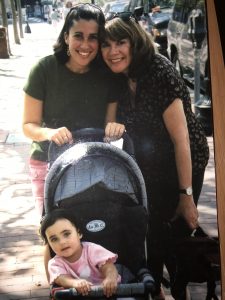On Mother’s Day 2019, my then 14-year-old daughter Risa and I started the morning by looking through scrapbooks filled with photos of my mom. She’d died a few months prior, and it was our first time pulling out photos. We smiled at the pics of my mom that were so quintessentially her: wearing a goofy homemade bonnet at the NYC Easter Parade (she was Jewish but lived each year for this parade); taking Risa to the fanciest hotels for a tour of the ballrooms; hosting way-too-complicated scavenger hunts with an absurd number of items to track down. Risa and I were entirely caught up in reminding each other of our silliest memories.
The mood changed about an hour later, when the texts started coming in from well-meaning friends: “I know you must be devastated today…,” “I am sending hugs on this very hard day,” and “I bet Risa is missing her amazing grandmother today!” Their intention was so clearly loving and generous. My friends wanted to support me by showing up before their own celebrations with their moms started. But the truth is, their texts made me feel worse, and that sadness spilled onto Risa. Was there something wrong with us for not feeling sad? Should it be a horrible day? Meanwhile, I could practically hear my mom yelling, “Screw that, go back to the giggling and fun pictures of me!”
Here’s the thing: Everyone grieves in their own way, and we simply can’t make assumptions about how people are feeling on Mother’s Day, or any day. It’s also likely that the person who suffered the loss has multiple feelings and reactions throughout the day, or in any given hour. What may seem like an obviously sad day to you might be a perfectly wonderful day for the person who experienced the loss.

With my mom and daughter from 2005
It’s often the in-between moments.
For me, grief doesn’t typically “get me” on the holidays and big milestones. It happens in the in-between moments when my guard is down. When I was 20, my father died in a car accident, and I thought Father’s Day and his birthday would be the hardest days. Instead, the biggest waves of grief came at random moments: when I saw someone at the drugstore who looked like him, hearing a Paul Simon song he loved, seeing an old vintage car on the highway that he would have admired, and so on. I should add that now when those unexpected connections pop up, they are far more likely to fill me with warmth than sorrow, but that took a long while.
Risa misses her grandmother, who was a huge cheerleader in her life, at random moments too: when she wants to brag shamelessly about her report card, when she craves the kind of spoiling that only a grandparent can do justice to, and when she’s looking to split a hot-fudge sundae with no one to say “slow down.” Risa especially misses her New York City adventures with my mom, and feels deep sadness whenever we visit other family there. Those are the hardest moments.
For plenty of people grieving a mom or caregiver, this Sunday will be painful. Your grieving friend or family member may want, even need, to talk about their loss. Or they may feel like Risa and I did, content and connected and looking to share positive memories. You can’t know because you are not a mind reader, no matter what their age or situation.
So what are the magic words you can offer?
Unfortunately, there are no magic words. The best thing you can do is ask your people how they are feeling. Reach out this Mother’s Day and say something like, “Hey, thinking about you and checking in to see how you’re feeling today?” Or, “You’re on my mind today. How is your morning going so far?” That way, the person grieving can tell you how it’s going with no assumptions or expectations.
In my case, if my friends asked how I was doing, I would have texted back, “Great – looking at old pictures of my mom with Risa and having sweet memories!” It would have felt good to let them know that. But I didn’t say anything because I worried that they’d feel guilty for having made wrong assumptions. Days later, I let them know as gently as I could about my reaction, and that I’d love it if next time they’d ask how I was doing rather than assume. Their reaction: relief. Sure, they felt a little bad about saying the wrong thing for me, but they were more happy to have just the right thing to say for next time. This was a perfect Mother’s Day gift for me.
Michelle Cove is the Senior Communications Manager at Experience Camps. She is an award-winning documentary filmmaker, journalist, and national bestselling author whose projects have been featured on numerous national platforms including “The Today Show,” The Washington Post, The Boston Globe, and The New York Times.

This is wonderful….Because grieving, mourning, and remembering are so individual, this kind of query opens the door for the individual to say…feel…whatever he/she is feeling. It also legitimizes the range of feelings that individuals experience…they are all “normal.”
“Unfortunately, there are no magic words. The best thing you can do is ask your people how they are feeling.”
AMEN!!! This is the truth for SO MUCH. Thank you for naming this and for giving voice to more opportunities for us all to ask questions, be curious, and hold each other with honest, assumption-less love.
I JUST LOVE THIS!! Wise words and a lovely tribute. Remembrance can trigger and overflow with so many feelings. And it’s all okay. Sometimes it’s revisiting the comfort of old, shared rituals, and sometimes it’s switching to new ones, like lobster instead of turkey for Thanksgiving!?
This is wonderful. Reading this brought back many memories and led to s great discussion with peter. Thanks for sharing this with us xoxo elsa❤️❤️
Thanks, everyone! I so appreciate the kind words. My childhood friend Pam just told me that she wanted to reach out to grieving friends on days like Mother’s Day but felt too scared of saying something “dumb.” She said she now will call them because she knows what she can say. It makes me feel so happy that she feels empowered and can better support others. Let’s all keep talking about this kind of stuff! Xo